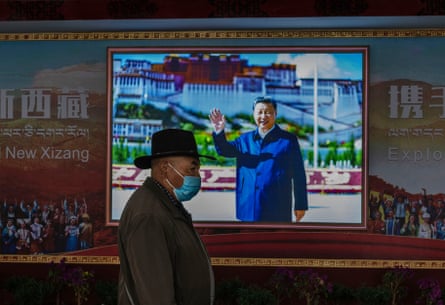A recent report reveals that numerous Tibetans across the globe have been targeted with surveillance, extortion, and intimidation due to their family members residing in Tibet.
Researchers state that while the oppressive tactics of the Chinese government in Tibet have been well-documented, the recent report from the Tibetan Centre for Human Rights and Democracy (TCHRD) is the first to examine the extensive persecution of Tibetan exiles in countries such as the US, India, France, Australia, and Canada.
The Chinese government is increasingly trying to suppress discussions or disapproval from Tibetans, Hong Kong citizens, and Uyghurs beyond its own borders using a strategy called transnational repression.
A Tibetan individual named Dhonden, who resides in Switzerland, informed the TCHRD researchers that in 2021, they received a video call from one of their relatives in Tibet. Upon answering the call, they discovered that their relative was at the local police station, accompanied by half of their family.
The police advised me to behave appropriately while overseas and avoid participating in actions that may contradict Chinese policies. They warned that if I did not comply, my family would face repercussions.
A group of researchers collected statements from 84 Tibetans who have been forced to leave their country and now reside in 10 different nations. Of these individuals, 49 reported receiving threats against their family members who still remain in Tibet. It is estimated that there are approximately 125,000 Tibetans living in exile overall.
Tenzin Dawa, the executive director of TCHRD, stated that the issue was significantly worse in Europe compared to other regions. She also noted that US officials were more proactive in addressing Chinese transnational repression.
During certain times, such as the Tibetan new year and the anniversary of the 1959 uprising, Tibetans have experienced heightened levels of oppression and separation from their loved ones.
In 1951, China claimed to peacefully liberate Tibet, although Tibetans view it as an invasion. Since mass protests in 2008, the government has intensified its suppression in the area.
According to Tsering Topgyal, a faculty member in international relations at Birmingham University, Tibetans residing outside of their homeland are being specifically targeted due to their highly organized nature and outspoken opposition to Chinese Communist party leadership.
After the establishment of the Central Tibetan Administration in the 1960s, Tibetans have created educational institutions and religious organizations, while also raising awareness for their rights on a global scale.
According to a security official from the Central Tibetan Administration, located in Dharamshala, India, approximately 80-90% of Tibetan refugees who have relatives residing in Tibet have encountered cross-border suppression.
Tibetan educational sociologist Gyal Lo, who escaped from China to Canada in 2021, stated that there has been a significant change in the capability of individuals to openly discuss topics such as Tibet in China since Xi Jinping’s second term as president in 2018.

In the past, Gyal Lo had conversations with Han Chinese friends and colleagues about Tibetan autonomy during a dinner. However, since 2018, many of them have ended their relationship with him.
Following pleas from his relatives, Gyal Lo has stopped publicly denouncing the Chinese government in international media. As a result, he no longer feels comfortable communicating with his family.
“I informed my 86-year-old father that I had to leave, but reassured him that I would visit him again soon,” he recalled. “I never thought that I would completely lose touch with my family.”
According to Gyal Lo, the practice of transnational repression has not only cut off family ties, but also weakened unity among the Tibetan community living outside of Tibet. This has also limited their ability to come together and protest against Chinese policies in Tibet.
Source: theguardian.com

















